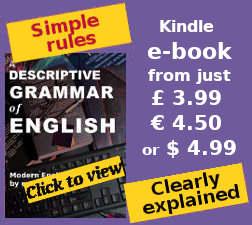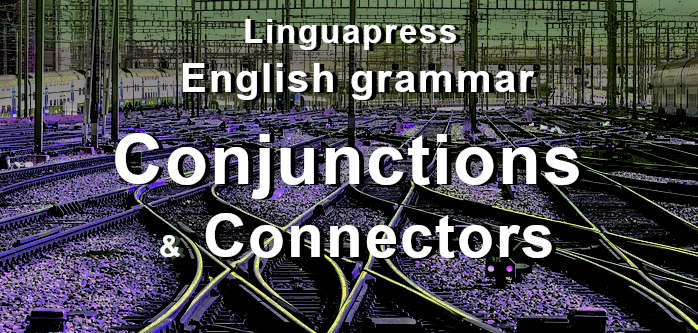Linguapress English Grammar
Conjunctions and connectors in English
Coordinating
conjunctions and subordinating conjunctions – connectors and
conjunctive adverbs.
Key points :
Connectors
- also called conjunctive words - are words that link two similar
elements in a sentence.
- The four categories of connector , which are explained below, are
- coordinating conjunctions, such as and or or,
- subordinating conjunctions such as if, so that, because or while. and
- correlating conjunctions such as neither... nor
- The fourth group of connectors consists of conjunctive adverbs such as therefore or however
- A small number of conjunctions and conjunctive adverbs can link individual words or phrases; but the majority can only link two clauses.
- A coordinated clause or phrase must follow the clause or phrase to which it is connected.
- A subordinate clause normally follows the main clause, but in some cases may precede it. See below.
- In most cases the difference between subordination and coordination is clear, but in some cases linguists disagree.
Part 1. Conjunctions
1. Coordinating conjunctions :
TOP value
offer
the acclaimed reference grammar
Print editions from Amazon,
Barnes & Noble, Waterstones
and other good bookshops
Coordinating conjunctions are used to link two clauses or
phrases of
equal value or equal status.the acclaimed reference grammar

Print editions from Amazon,
Barnes & Noble, Waterstones
and other good bookshops
There are only a small number of coordinating conjunctions in English: most sources repeat what others say, and list the following seven, using the convenient acronym FANBOYS.
- for, and, nor, but, or, yet and so.
- For can be forgotten, as it is hardly ever used as a coordinating conjunction in modern English. It has been replaced by because or as.... which are clearly subordinators.
- As for So,
grammar books and websites provide contradictory and often ambiguous
information. So
let's clarify the situation.
When so implies purpose it is clearly a subordinating conjunction. The subordinate clause can come before or after the main clause.OK I bought a new camera so I could take better pictures.
OK So I could take better pictures, I bought a new camera.
When so implies
consequence
linguists disagree as to whether it is a coordinator
a subordinator .
But either way, the so
clause must follow the main clause. Probably the best way to
define so
implying
consequence is as a conjunctive
adverb.
For clarification see English
grammar - so
OK I bought a
new camera
so I took better pictures.
NOT OK So I took better pictures, I bought a new camera.
NOT OK So I took better pictures, I bought a new camera.
- Many online dictionaries and printed grammar books do not bother to distinguish between the usage of so for purpose and so for consequence, or are very ambiguous on this point.
- And and or can link individual words or clauses; yet, and but normally only link clauses, but sometimes link two words. Nor cannot link words when it is a coordinating conjunction it can only do so in partnership with neither, as a correlative conjunction.
USAGE: Coordinating connectors give equal value to the two elements that they coordinate.
They must be placed between the two elements that they coordinate.
Examples:
I
want three beers and
a glass of lemonade
He went to bed and went to sleep.
You can have the chocolate mousse or the lemon tart
They'll win, or they'll lose.
This present is not for Peter, but Paul
I bought a new dress that was not red but pink.
We're going to Paris, but not to Rome.
We're going to Paris, but we're also going to Rome.
He was very tired yet very happy.
The director was rather young, yet the company was successful.
He went to bed and went to sleep.
You can have the chocolate mousse or the lemon tart
They'll win, or they'll lose.
This present is not for Peter, but Paul
I bought a new dress that was not red but pink.
We're going to Paris, but not to Rome.
We're going to Paris, but we're also going to Rome.
He was very tired yet very happy.
The director was rather young, yet the company was successful.
Can you start a sentence with a conjunction?
A lot of grammar books claim that it is wrong to start a sentence with a conjunction. This is just wrong !Most of the great writers in the English language have from time to time used sentences starting with conjunctions. In the "King James" version of the Bible, which was the standard work of reference for style in the English language for three hundred years, two of the first three sentences in the first chapter of the book of Genesis start with And.... These initial "ands" remain present in the main modern 20th or 21st century versions of the Bible, including the Contemporary English Version (CEV) and the American Standard Version (ASV) . So yes, you can start a sentence with a conjunction.
2. Subordinating conjunctions :
Subordinating conjunctions are used to link two clauses within a single sentence, when one clause is subordinate to the other.In other words, the subordinate clause clarifies, expands or explains the meaning of the main clause.
Some types of subordinate clause are introduced by subordinating conjunctions, others (such as relative clauses) are not. Common subordinating conjunctions include
- as , because and since (cause)
- so and so that (purpose)
- although and though (contrastive)
- after, before, until, while, etc. (temporal)
- if, unless, as long as, other than or but, provided, whenever, whatever (conditional, indirect question)
- that (reported speech, indirect statement, consequential)
USAGE:
Subordinating conjunctions must come at the start of the subordinate clause.
There are two sorts of subordinate clauses.
- Most subordinate clauses can come either before or after the main clause. So unlike coordinating conjunctions, subordinating conjunctions can stand at the start of a sentence.
- But indirect questions, relative clauses, and other subordinate clauses introduced by that, must normally be placed after the main clause, just like a coordinated clause (Examples 12, 16 and 17)
- So
is a subordinating conjunction when it is used to denote a purpose. A so clause denoting
purpose does not usually come before the main clause, but it is not
impossible (example 6).
When so is used with the meaning of therefore or hence or and similarly , it is a conjunctive adverb.
Examples:
In these examples, it is not possible to invert the two clauses in sentences written in red. In all other cases, as in examples 1a and 1b, inversion of the main and subordinate clause is possible.
In these examples, it is not possible to invert the two clauses in sentences written in red. In all other cases, as in examples 1a and 1b, inversion of the main and subordinate clause is possible.
- a) I 'm going to London because I've got a new job.
b) Because I've got a new job, I'm going to London. - Since it's raining, I'm going to the cinema this afternoon.
- She didn't want any more wine, as she'd already drunk enough.
- As she'd drunk enough, she didn't take any more wine.
- I'm locking the door, so nobody can get in
- So he wouldn't forget to wake up, he set his alarm for 5.30.
- Although I love him, I wouldn't want to marry him.
- This book is good, though some bits of it are rather boring.
- After I finished work, I went straight home.
- Until they opened a new factory, they could not produce enough
- If you see anything suspicious, let me know at once.
- He asked the policeman if he knew of a good restaurant.
- We don't have much choice other than to (or but to) tell him.
- Provided you can swim, you can come out on our yacht.
- You can come out on our yacht, as long as you can swim.
- I won't go there, whatever he says.
- This ice-cream is so good, that I'm going to have another one.
- The man said that he was born in New York.
► See also more
information on these pages :
► Continue
to part 3 : ►
(such as Not only....
but also)

Look at English grammar with Linguapress. Simple rules, clear examples.


 Copyright
information.
Copyright
information.